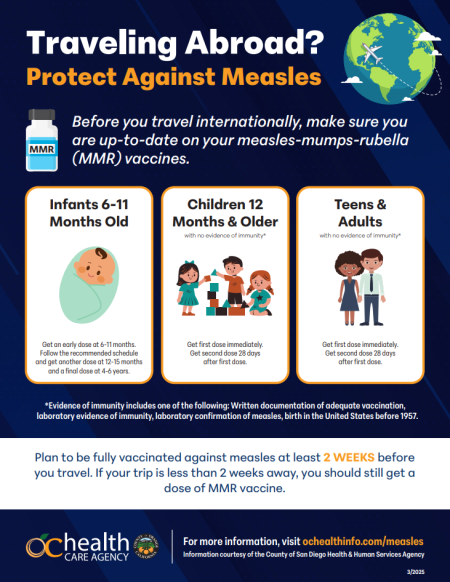Measles Information for General Public
Measles is a highly contagious viral illness. Measles presents with a fever and characteristic rash. Measles can be a serious disease:
- 1 in 5 people who get measles are hospitalized
- 1 out of 1,000 people with measles develop encephalitis (swelling of the brain)
- 1 to 3 out of 1,000 people with measles die
Measles can be prevented with measles vaccine, usually as part of the Measles-Mumps-Rubella (MMR) vaccine. Additional Information on measles can be found at the California Department of Public Health's Measles page.
Measles Information for Healthcare Providers
- When and how should I report a measles case?
- When should I suspect measles in a patient?
- What is the best way to test for measles virus?
- What are the specimen collection requirements for measles PCR testing at the Orange County Public Health Laboratory?
- How can I limit transmission in the healthcare setting?
- Provider Resources
When and how should I report a measles case?
Measles is immediately reportable in Orange County, even if the case has not yet been confirmed but is suspected. Do not wait until lab confirmation to report suspect cases. To report a case, health care providers/facilities should call OCHCA Communicable Disease Control Division at 714-834-8180. OCHCA can facilitate prompt laboratory testing results.
When should I suspect measles in a patient?
Measles is an acute viral illness characterized by fever, cough, coryza and conjunctivitis, followed by a maculopapular rash which begins on the face and spreads down the body and out to the extremities.
Measles has been eliminated from the United States apart from reintroductions from travelers and occasional outbreaks. Measles remains common in many other parts of the world. A travel history is not required to consider measles but travel in an individual with a clinically compatible illness increases the likelihood of measles.
Individuals with documented receipt of two measles containing vaccines, or well documented prior disease constitutes proof of immunity. Rarely, measles has been seen in adults who have received two doses of measles containing vaccine with known exposures.
What is the best way to test for measles virus?
The best and quickest way to test for measles is to call OCHCA Communicable Disease Control Division at 714-834-8180, who can assist in doing measles PCR testing at the OC Public Health Laboratory (OCPHL). This method can provide results, which are critical for public health control measures, within 24 hours. Commercial laboratories provide measles PCR testing but our preference is that specimens be submitted to us because we can provide rapid turn-around-times to results.
Serological testing for measles IgM is no longer the preferred due to higher rates of false positive results, particularly when the pre-test probability of measles is low. Measles IgG testing can help confirm immunity in exposed individuals and is available from most commercial laboratories but is NOT done at the OCPHL.
What are the specimen collection requirements for measles PCR testing at the Orange County Public Health Laboratory?
Specimens will not be accepted without prior approval for testing from the OC Communicable Disease Control Division. Use a synthetic fiber swab (cotton, calcium alginate or swabs with wooden shafts are not acceptable). Swabbing of the throat (rubbing the tonsils and posterior pharynx) is the preferred collection site, although NP swabs or urine specimen can be tested. Swab should be placed in a sealable vial with 2-3 ml of viral transport media (VTM) or universal transport media (UTM). Urine specimens (10-50 ml) are accepted in a sterile screw top container. Specimens for measles PCR testing must be collected within 2 weeks of the cases rash onset.
For additional information, see CDPH Measles Specimen Collection Poster.
How can I limit transmission in the healthcare setting?
Measles is highly contagious and spreads via airborne transmission. Spread to non-immune individuals in healthcare setting is common. When possible, in the primary care setting patients with fever and rash and a risk for measles should be assessed at the end of the day so that the exam room can be left empty until the next day, or in an outdoor setting if practical. In the acute care setting patients with fever and rash should be rapidly triaged to an airborne isolation room. Assure that clinical staff have evidence of measles immunity:
- Receipt of two doses of measles-containing vaccine
- Laboratory confirmation of immunity to measles infection
- Birth before 1957
Resources
- Protecting Against Measles
Arabic | Chinese Simplified | Chinese Traditional | English | Farsi | Korean | Russian | Spanish | Vietnamese

Page Last Updated: 1/31/2026

